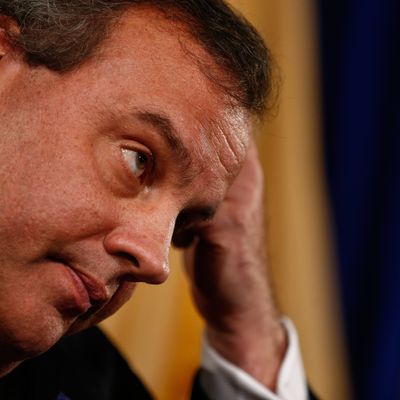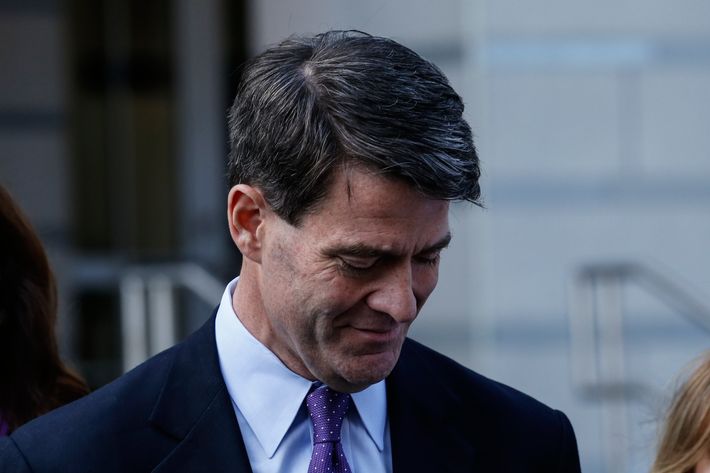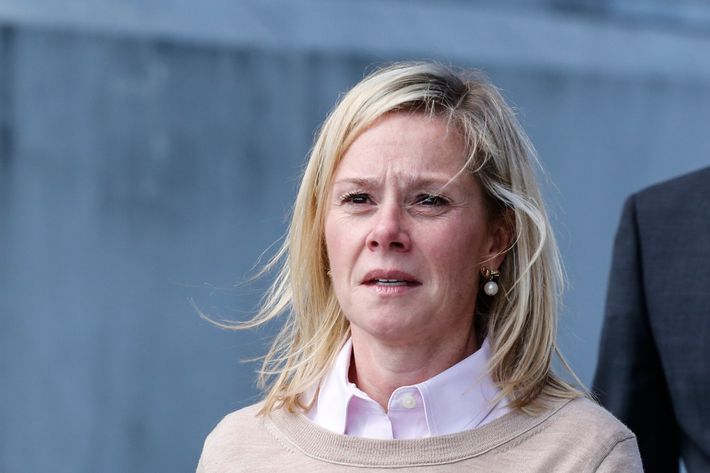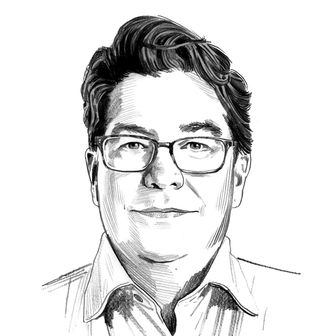
Sitting in the courtroom through six weeks of testimony in the trial of two New Jersey public officials charged with jamming traffic for political purposes, sometimes I wondered how jurors could manage to comprehend what they were hearing. The prosecution told them a story of a convoluted conspiracy to commit a seemingly purposeless crime, while the defense displayed charts depicting Governor Chris Christie’s inner circle, shooting off arrows of suspicion in all directions. But in the end, it seems, the jury kept its focus on just one of those arrows: the one pointing at David Wildstein, the mastermind of the plot, and the prosecution’s key witness.
The jury chose to believe Wildstein, and voted for conviction on all counts today.
Time for my own confession: I don’t know if that is where I would have come down if I were a member of the jury. During closing arguments, attorneys for the two defendants, former Port Authority official Bill Baroni and former Christie aide Bridget Anne Kelly, made what sounded to me like strong cases for reasonable doubt. They returned, again and again, to Wildstein, the former political operative and anonymous blogger with a colorful history of dirty tricks and deception. “‘I swear under oath that I’m a liar’ — that’s what he said,” Michael Baldassare, Baroni’s defense attorney, said in his closing argument.
Projecting a picture of Governor Christie and Wildstein gazing at each other in a way that appeared adoring, defense attorney Michael Critchley referenced a dramatic alteration in the former operative’s appearance over the last three years. “David Wildstein can change his looks, he can put a beard on, he can lose 75 pounds,” Critchley said. “But you know what he can’t change? He can’t change who he is.” Having watched Wildstein’s performance on the witness stand, which was shifty at times, and having heard the unanimously negative testimony of his former colleagues at the Port Authority, who called him an “intimidator” and a “cancer,” I wondered whether the jury might have its own doubts.

In the end, though, the jury accepted Wildstein’s word and not those of Baroni and Kelly, both of whom testified in their own defense. Over more than a week on the stand, Wildstein told an improbable story of traffic cones, revenge, and hubris among the highest advisers to Christie, whose credible shot at the presidency was destroyed by the scandal. To briefly recap: Wildstein claimed that he came up with the idea of closing off the town of Fort Lee’s local access lanes to the George Washington Bridge as a way to punish the town’s Democratic mayor, Mark Sokolich, whom he said was targeted because he had spurned overtures from Kelly’s office, which was trying to line up party-line-crossing endorsements for Christie’s 2013 reelection campaign. (For more on that testimony, see here, here, here and here.) Wildstein testified that Baroni, his boss, enthusiastically approved his plan, while prosecutors presented evidence that Kelly had authorized him to implement it in a one-line email: “Time for some traffic problems in Fort Lee.”
Prosecutor Lee Cortes Jr. projected Kelly’s email as he began his closing statement. “Those words are clear, those words are definite,” he said. “Her words mean exactly what they say.” Though there was no similar documented exchange between Baroni and Wildstein, Cortes showed phone records revealing the men, who were close friends and had a political relationship that went back decades, talked on the phone many times a day— “just a staggering amount of communication between two people.”
Baroni and Kelly’s attorneys argued that Wildstein led their clients to believe that he was conducting a “traffic study” about ways to ease congestion for the main approaches to the bridge, one that had the collateral effect of creating traffic problems in Fort Lee, but denied being aware of any punitive purpose. They pointed out that Baroni and Kelly never spoke with each other about Wildstein’s plan to close the lanes. But Cortes argued that Wildstein was “the glue” of the conspiracy, linking the two of them.
“They knew who David Wildstein was and what he was capable of,” Cortes said. “They knew what he was about … [and] he was not about moving traffic.”
In its rebuttal, the prosecution returned to its most damning evidence: text messages that appeared to show the defendants taking pleasure in being cruel to children. In one, Baroni asked Wildstein if there was “anything we can do” in Jersey City — which also had a Democratic mayor who was feuding with Christie — for the first day of school, and replying “unfortunate” when he was told there was not. Wildstein testified that it was Baroni’s idea to make the lane closings in Fort Lee coincide with the reopening of schools, trapping school buses in the traffic jam. The prosecution projected Kelly’s contemporaneous reaction to that news: a series of text message exchange in which she wrote “Is it wrong that I am smiling?” and “I feel badly for the kids … I guess.”
“Smiling as schoolkids are stuck in traffic,” said prosecutor Vikas Khanna. “Don’t let them whitewash it. It’s as outrageous as it sounds.”
The prosecution presented evidence that Baroni, too, laughed about the pain he and Wildstein were inflicting, “bragging” about it to Christie during an encounter he and Wildstein had with the governor before a September 11 memorial service at the World Trade Center; and making an inside joke as he prepared to try to cover up the crime in testimony before the state legislature, sending Wildstein a photo of Harvey Keitel as Winston Wolf, the “cleaner” in Pulp Fiction. (One of several nicknames Christie had for Wildstein was “Mr. Wolf,” according to testimony at the trial.)
“Not only did they execute this scheme,” Khanna said. “They delighted in it.”
Though the prosecutors were ultimately successful in securing a guilty verdict, their case left several unanswered questions. Chief among them: Who really ordered the crime, and why? In the first count of the indictment against Kelly and Baroni, prosecutors alleged that the motive was punishment — cracking the whip on a Democratic officeholder who wouldn’t fall into line behind the Republican governor. But there was little evidence presented to explain why Sokolich, a relatively insignificant officeholder who had previously enjoyed good relations with the Christie administration, was singled out for particularly elaborate retribution. But in her instructions to jurors, and again in response to a question from them during deliberations, Judge Susan Wigenton ruled that prosecutors did not need to prove that Kelly and Baroni intended to punish the mayor.

The defense decried the decision. “You’re directing a verdict of guilty,” Critchley said vehemently at a hearing earlier this week. He may have been right. The defendants have vowed to appeal.
Beyond motive, there’s also the question of who in particular was so furious with Sokolich? Baroni, by Wildstein’s own testimony, tended to play good cop to his bad cop, and had a friendly relationship with the mayor. Kelly, a demure single mother, did not come across during the trial as either a vengeful person or a high-level decision-maker. The evidence presented did suggest that Bill Stepien, Christie’s campaign manager, was deeply involved with Wildstein’s plans, and had a mean streak, ordering that officials who displeased the governor were to be “frozen out.” But Stepien, now the national field director for the Donald Trump campaign, was never charged or even called to testify.
In the end, though, it is hard to resist the conclusion that the arrow points to the governor. Numerous witnesses testified that Christie was a micromanager who reveled in playing political hardball. (One memorable bit of testimony revealed that Christie called and threatened to “fucking destroy” a county freeholder after it got back to the governor that he was complaining about the disbursement of Hurricane Sandy relief funds. In the governor’s defense, the freeholder had also called Christie a “fat motherfucker.”) Kelly testified that when Wildstein first approached her with his “extraordinarily weird” plan for the bridge, she took it to Christie, who approved it. Wildstein testified that when he and Baroni joked about Fort Lee’s traffic jam with Christie on September 11, the governor laughed appreciatively. The Port Authority’s executive director testified that when he found out about the lane closures and tried to put an end to them, Baroni stormed into his office, furious, and told him they were “important to Trenton.” Within the Port Authority, “Trenton” was shorthand for the governor of the state of New Jersey.
After the verdict, Christie released a statement vowing to “set the record straight in the coming days regarding the lies that were told by the media and in the courtroom.” His political future seems grim, however. In recent weeks, he has receded from his formerly prominent role as a surrogate for Trump, perhaps due to the embarrassment of the trial. The Wall Street Journal reported today that Christie was unprepared for the tenor of the testimony and the large number of negative disclosures, with aides describing him as rattled and angry at times. There is talk of a state-level prosecution, or impeachment — though the latter course seems unlikely, since the Democrats are well-positioned to take back the governor’s office next year, and they would prefer not to elevate his lieutenant governor. Christie is such a figure of national ridicule that he is worth more to his opponents in office.
In his closing argument, Critchley appeared to try to sway the jury’s sympathies toward his client by asking why she was on trial, and not her bosses. He cupped his hands around his mouth and shouted at the top of his lungs, “Chris Christie, where are you?”
With this verdict, it seems assured that the answer to that question will soon be: far from power, for good.






























